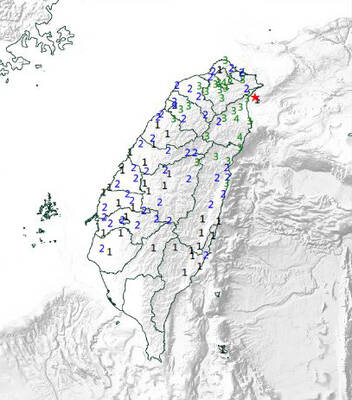Popular herbal remedy drinks Paolyta B (保力達B) and Sanyo Whisbih (維士比) are alcoholic beverages categorized as a non-prescription medication and are prohibited from being sold at convenience stores, betel nut stands or other business establishments without a drug company license, the Food and Drug Administration (FDA) said yesterday.
“The administration and local health departments inspected a total of 105 betel nut stands in Taipei City, Greater Taichung and Greater Kaohsiung last month, of which 14 were found illegally selling the herbal liquors without a permit,” FDA Northern Center section head Wu Ming-mei (吳明美) told a press conference in Taipei yesterday morning.
However, the national retailer violation rate concerning alcoholic herbal beverages sales dropped from 38 percent in a March inspection to 13 percent in the inspection conducted last month, Wu said.
The significant decrease indicates that the administration’s frequent impromptu inspections have helped deter such irregularities, which is punishable by a fine ranging from NT$30,000 to NT$150,000 as stipulated in Article 92 of the Pharmaceutical Affairs Act (藥事法), she added.
Wu said the herbal beverages are often consumed by construction site workers before or during work because they are believed to be effective in relieving fatigue.
“However, as such drinks contain an alcohol content of about 9 or 10 percent, which could impede the workers’ concentration during work, most of which involves operating heavy construction equipment, it therefore puts their safety at risk,” Wu said.
There have also been multiple cases in which blue-collar workers have been sentenced to several months in prison for driving under the influence after drinking the herbal drinks, she said.
“Consumers are advised to drink the herbal liquors no more than three times a day and less than 40 mililiters each time,” Wu said.
“Long-term or overconsumption of the alcohol-laced beverages would have the same detrimental effect on the liver as any other alcoholic drinks would,” Wu said.

A 72-year-old man in Kaohsiung was sentenced to 40 days in jail after he was found having sex with a 67-year-old woman under a slide in a public park on Sunday afternoon. At 3pm on Sunday, a mother surnamed Liang (梁) was with her child at a neighborhood park when they found the man, surnamed Tsai (蔡), and woman, surnamed Huang (黃), underneath the slide. Liang took her child away from the scene, took photographs of the two and called the police, who arrived and arrested the couple. During questioning, Tsai told police that he had met Huang that day and offered to

LOOKING NORTH: The base would enhance the military’s awareness of activities in the Bashi Channel, which China Coast Guard ships have been frequenting, an expert said The Philippine Navy on Thursday last week inaugurated a forward operating base in the country’s northern most province of Batanes, which at 185km from Taiwan would be strategically important in a military conflict in the Taiwan Strait. The Philippine Daily Inquirer quoted Northern Luzon Command Commander Lieutenant General Fernyl Buca as saying that the base in Mahatao would bolster the country’s northern defenses and response capabilities. The base is also a response to the “irregular presence this month of armed” of China Coast Guard vessels frequenting the Bashi Channel in the Luzon Strait just south of Taiwan, the paper reported, citing a

BETTER SERVICE QUALITY: From Nov. 10, tickets with reserved seats would only be valid for the date, train and route specified on the ticket, THSRC said Starting on Nov. 10, high-speed rail passengers with reserved seats would be required to exchange their tickets to board an earlier train. Passengers with reserved seats on a specific train are currently allowed to board earlier trains on the same day and sit in non-reserved cars, but as this is happening increasingly often, and affecting quality of travel and ticket sales, Taiwan High-Speed Rail Corp (THSRC) announced that it would be canceling the policy on Nov. 10. It is one of several new measures launched by THSRC chairman Shih Che (史哲) to improve the quality of service, it said. The company also said

A magnitude 6 earthquake last night at 9:11pm struck off northeastern Yilan County, the Central Weather Administration (CWA) said. The earthquake’s epicenter was located in waters between Toucheng Township (頭城) and Turtle Island (Gueishan Island, 龜山島), about 22.1km northeast of Yilan County Hall at a depth of 112km, CWA data showed. There were no immediate reports of damage. The earthquake’s intensity, which gauges the actual effects of a temblor, was highest in Yilan’s Dongshan (冬山) and Nanao (南澳) townships and Taipei’s Xinyi District (信義), where it measured 4 on Taiwan’s seven-tier intensity scale. It measured 3 in other areas of Yilan and Taipei, as